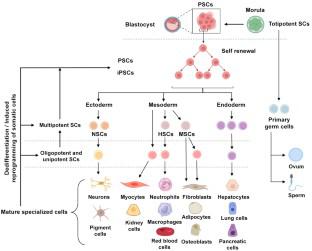Biochemistry (Moscow) ( IF 2.8 ) Pub Date : 2023-12-27 , DOI: 10.1134/s0006297923120076 Alexander V. Burov , Andrey A. Rodin , Vadim L. Karpov , Alexey V. Morozov

|
Abstract
Selective degradation of cellular proteins by the ubiquitin–proteasome system (UPS) is one of the key regulatory mechanisms in eukaryotic cells. A growing body of evidence indicates that UPS is involved in the regulation of fundamental processes in mammalian stem cells, including proliferation, differentiation, cell migration, aging, and programmed cell death, via proteolytic degradation of key transcription factors and cell signaling proteins and post-translational modification of target proteins with ubiquitin. Studying molecular mechanisms of proteostasis in stem cells is of great importance for the development of new therapeutic approaches aimed at the treatment of autoimmune and neurodegenerative diseases, cancer, and other socially significant pathologies. This review discusses current data on the UPS functions in stem cells.
中文翻译:

泛素-蛋白酶体系统在干细胞生物学中的作用
摘要
泛素-蛋白酶体系统(UPS)对细胞蛋白质的选择性降解是真核细胞的关键调节机制之一。越来越多的证据表明,UPS 通过关键转录因子和细胞信号蛋白的蛋白水解降解以及后处理参与哺乳动物干细胞基本过程的调节,包括增殖、分化、细胞迁移、衰老和程序性细胞死亡。用泛素对靶蛋白进行翻译修饰。研究干细胞中蛋白质稳态的分子机制对于开发旨在治疗自身免疫和神经退行性疾病、癌症和其他具有社会意义的病理学的新治疗方法具有重要意义。这篇综述讨论了干细胞中 UPS 功能的最新数据。



























 京公网安备 11010802027423号
京公网安备 11010802027423号